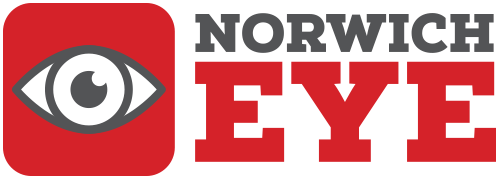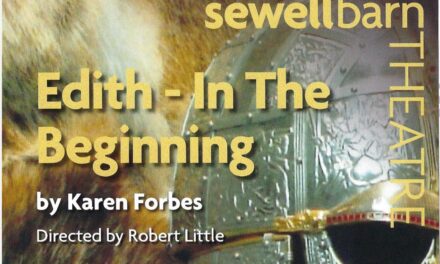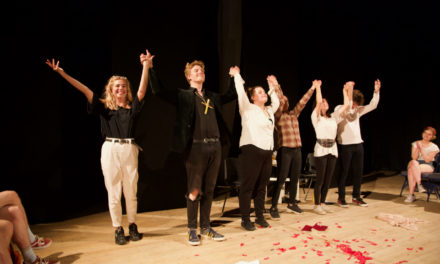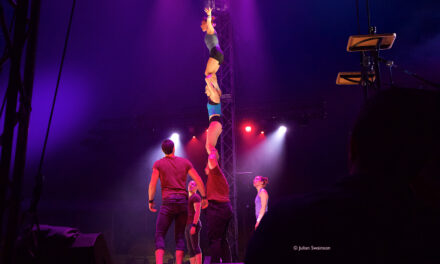Creative Pride 2018
Transgender artist and campaigner Kate O’Donnell will present her show, You’ve Changed, in Norwich Theatre Royal’s Stage Two on Wednesday and Thursday, July 25 & 26. The show is part of Stage Two’s Creative Pride 2018 festival, celebrating ten years of Norwich Pride.
It is 15 years since Kate transitioned and a lot has changed. Through song, dance, hard-won wit and wisdom, she collaborates with choreographers, musicians and filmmakers to explore the ins and outs and ups and downs of transitioning.
Kate, who was the LGBT Foundation’s 2016 role model, recently formed Trans Creative. Thought to be the first trans-led theatre company and now in receipt of financial backing from Arts Council England’s Elevate fund, it aims to create more opportunities for trans people and challenge the way in which they are frequently represented.
She told Judy Foster about her own experience in transitioning, how she feels the arts can create social change, and what audiences can expect from her show.
What does it mean to be transgender?
For me it means I identify as trans. There are many different ways you can be transgender. In terms of identifying as a gender, I was born as a boy with a male body. I never felt like a boy and I went to an all boys’ school, and it was great in some ways because I got to play all the girl parts in all the school plays.
 As I grew up there were no positive visible representations of people being trans. Literally nobody had heard of it. So because of that I ended up living as a gay man. That wasn’t working out for me because I didn’t connect with that as a sexuality and it was probably still wrapped up in gender because I didn’t feel like a man. I worked as a drag queen for a little while and then stopped doing that. Then somebody at work transitioned 15 years ago and that was when I thought ‘Oh God, is that what it is’ because I had heard of these people, transsexual people as they called them, personalities such as a Bond girl who was transsexual and terrible headlines.
As I grew up there were no positive visible representations of people being trans. Literally nobody had heard of it. So because of that I ended up living as a gay man. That wasn’t working out for me because I didn’t connect with that as a sexuality and it was probably still wrapped up in gender because I didn’t feel like a man. I worked as a drag queen for a little while and then stopped doing that. Then somebody at work transitioned 15 years ago and that was when I thought ‘Oh God, is that what it is’ because I had heard of these people, transsexual people as they called them, personalities such as a Bond girl who was transsexual and terrible headlines.
I think being transgender then is not what it is now. I feel like it is much more positive now. They have stuff like Trans Pride. We have more visibility and we have soap opera characters who are trans. We’ve got Caitlyn Jenner. I think people are much more aware of what it is. But I think culturally it’s quite new and so for me being transgender still feels quite new. I think before there was quite a lot of confusion and mystery, and back then people lived in stealth, so I think being transgender is much more on the table now.
Tell us a little bit about your own transition journey and what prejudices you faced along the way?
I think I was quite lucky. No journey is ever the same and I think there is something really interesting about that idea that we are moving from one thing to the other, whereas what that tends to mean is that people think you are moving from being a man to a woman or a woman to a man but actually I am moving towards being trans and that is evolving all the time.
Who I am as a trans person today is not who I was 15 years ago. My transition 15 years ago was very different to how people are transitioning now. You literally were on this conveyor belt. You lived as a woman, for two years in my case; you were going to have surgery, whether you wanted it or not; you kept it quiet; you lived in stealth. I had a boyfriend whose mum never knew I was trans and she used to go on and on about why I was never having children and I had to make up lies almost. So for my transition I think I did OK because I’d lived as a gay man. I’d lived as a drag queen. I had already been in this queer kind of world and also I am in theatre and performance so I was in a world that was much more suited to being more open to those ideas.
I’m not saying it wasn’t difficult and I did face some difficulties, and there is always sadness and disappointment from people who don’t want to get it or don’t want to be seen out with you and I tackle some of that in the show.
The sad thing back then is because trans people were so closed down and hidden they didn’t want to be seen out together because they were frightened that the more trans people who are seen out together then the more likely it was you wouldn’t ‘pass’. That was this concept of people not knowing you’re trans because back then it was ‘God forbid you should look trans and be looked at’.
I did kind of ‘pass’ in a way but it just felt like lying. I wasn’t having a lot of external prejudices because of the way I presented, but I feel internally it was pretty messed up really and you feel like you are having to bury things away. One ‘support’ group I went to, they encouraged you to move away from where you lived and burn all photos of yourself and that’s just not who I am. I don’t want to bury my past. I like to celebrate it. We all aren’t the same person we were when we were 20. As adults and as we grow up we’re all different people and I think it’s really sad to edit yourself. The prejudice I got was probably quite subtle in that I felt pressured to live in stealth and I think that’s sad.
What led you to want to share that journey with a wider audience?
I felt it was time. Four years ago I started performing. I hadn’t done any performing for quite a long time. I’m very interested in the arts and I really wasn’t seeing me on stage and I wasn’t seeing me on film and I wasn’t hearing me in radio plays. I just wasn’t getting a presence of who I am. There was also a lot of homophobia and transphobia in Russia about four or five years ago, and I thought we’re quite privileged over here in the West. We have a platform. I don’t feel censored, especially on stage.
So I thought I would make a little show and it was more an experiment to see what would happen. The show was called Big Girl’s Blouse, which is the name that my dad used to call me on a daily basis growing up. It was a lot of fun and it toured for nearly two years. It won awards. It really started me thinking this is something. I was working with vulnerable adults and I did all my performing at weekends and during my annual leave and it just got ridiculous. So I gave up my full-time job.
I definitely feel that arts can create social change and I have had people transition live on stage after my show. It’s been very profound. I love the fact I have found a way to tell my story and I have got to travel around the country and meet loads of trans people. I’ve had very positive feedback that there’s a need for us to be telling our own stories and there is an audience. It’s not just trans people. We all have our talents and our ways to express ourselves. Mine happens to be showing off, so that’s why I go for that option.
You’re a director as well as an actor, so perhaps you could tell us about your new venture with Trans Creative?
We were very lucky about a year and a half ago when we decided we needed to formalise the work we were doing a little bit more. We came up with the name Trans Creative – it was naming what we do and naming the people that get involved and setting our stall out, so when you book us you pretty much know what you’re getting. We’ve got Arts Council funding for three years and that is to set up a structure and start to develop this company. We have got a board now. I’m the artistic director.
While we are developing this company, we’ve also got our eye on projects. The project we have been working on recently is having a trans arts festival. It’s not just about my story because our tag line is ‘telling our own stories’. We are giving a platform to other transartists.
Trans Vegas is a festival we’ve just had in Manchester over four days and we have probably given a voice to 30 trans and genderqueer or non-binary artists to tell a story. It’s been absolutely amazing. It was full on and we had a transmasculine event and created podcasts and we worked with young trans people. So it is really exciting and I feel halfway through our funding we are on track and I am very clear who we are and I am very excited.
We’ve created a space for other transartists to share a bit of the experience I’ve had. I feel I was very lucky because I had the personality that could push through and get on stage five years ago, but not everybody has that so we have literally given a mike to people. Also as a director I direct theatre pieces for trans performances and events as well. So it’s been amazing. I gave up my job a year ago and I have never been so busy in my life.
So can you describe what audiences can expect from your show You’ve Changed?
I really throw everything at it. I really want people to spend that hour with me being entertained and while I am entertaining you I am also telling my story, challenging you a little bit. The story is called You’ve Changed and I have done a lot of changing in the last 15 years, but I am also asking the audience “Have you changed?” “Is this show going to help you change?” I think for transpeople there is an expectation for us to do all the changing, but actually it is the zeitgeist that now needs to catch up and catch on and go and read a book and go and look it up!
In terms of what you are going to get, I transition from Fred Astaire to Ginger Rogers in this show – visually, musically, aesthetically. In terms of dance, it is the 1930s. The 1930s was a really interesting time. It was the time of the depression and film and music was to rally people and keep them going, and the song we use in the show is Let’s Face the Music and Dance. That is my call to arms for transpeople. We are going to do it. We’re going to face the music and we’re going to have some fun. We’re going to do it with style and with a smile. Let’s do that because a lot of this journey is quite tricky and difficult but it is also very celebratory.
To get on with your life is very exciting. I chart 15 years of my transition. When somebody transitioned at work, they literally wrote me a list that day and I followed that list word for word and I create copies of that list, which is handwritten and 15 years old, to give out to members of the audience at the end.
We end with a beautiful reconstruction of a Fred Astaire and Ginger Rogers routine. I sing in it. I wrote some songs. I literally bare all because there is a lot of talk with trans people where our genitals often become the centre of attention, so I thought let’s make them the centre of attention. There’s film in it. There’s all sorts. You’re not going to be bored. I have a lot of fun. I think I am a slightly frustrated stand-up comedian.
You are a very visible example of an older transgender person – do you think mature people find it more difficult than the younger generation to be open about being transgender?
I think it is really different. I have just been working with young transpeople in Greater Manchester and to walk into some of their groups and see the energy they have and being 13 and thinking about transitioning is mind-blowing for me. I think that’s amazing. They are literally going into school after the summer holidays with a different name and a different gender and they are facing up to that. I can’t imagine what that is like.
I feel like there is a lot of hope with young people. I’m not saying it is perfect and some families really struggle with it. Culturally the numbers of young transpeople under 25 who have transitioned has gone up four or five fold. So it’s massive and it’s not going to go away and the impact of that on society we don’t know yet. I am really excited by what our society is going to look like.
I think young transpeople have a different task because they have to transition at home. They have to do all that with their families and that can be positive or negative. I have meet families who are very positive about their kids and I’ve met families who are less positive. So I think they have a different issue in that they are not independent. The Gender Recognition Act has just been reviewed and they are still saying that you can’t be trans until you are over 18, and there are things about hormone blockers and quite a lot of decisions to be made around that when you are young.
I think being older you have a bit more independence, but if you are much older you have created this life in a different gender and I think that can be really hard to unpack. I transitioned when I was 38, so I’m somewhere in the middle of where people transition. There are people transitioning much later in life where maybe they are waiting for their parents to die. Sometimes or they are waiting until they finish their jobs or maybe for their partners to die because they don’t feel like they can shatter their lives.
I think any age is difficult. I think what can happen with older people is there’s a sadness that they haven’t done it younger and I think with younger people there’s hope and excitement. My work seems to appeal to young and old. It’s available for everybody and I hope it speaks to everybody.
It sounds like you are quite hopeful about the future?
I am. The advice I give to people who are transitioning is ‘be excited’. ‘Be excited’ because no one else is going to tell you that. It’s not all doom and gloom, kids!
Listing: Kate O’Donnell in You’ve Changed, Wednesday and Thursday, July 25 & 26, 7.30pm, in Stage Two. Age guidance 14+ Q&A post performance on July 25. Tickets: £12 (£10 concs). www.theatreroyalnorwich.co.uk





Recent Comments